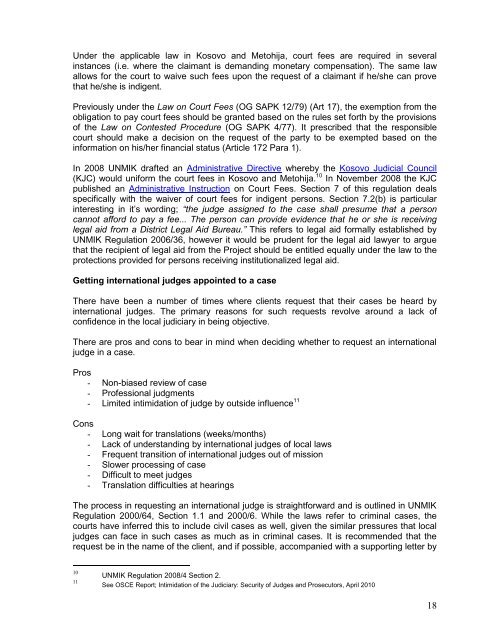Serbia Handbook for Legal Aid Providers Final
Serbia Handbook for Legal Aid Providers Final
Serbia Handbook for Legal Aid Providers Final
Create successful ePaper yourself
Turn your PDF publications into a flip-book with our unique Google optimized e-Paper software.
Under the applicable law in Kosovo and Metohija, court fees are required in several<br />
instances (i.e. where the claimant is demanding monetary compensation). The same law<br />
allows <strong>for</strong> the court to waive such fees upon the request of a claimant if he/she can prove<br />
that he/she is indigent.<br />
Previously under the Law on Court Fees (OG SAPK 12/79) (Art 17), the exemption from the<br />
obligation to pay court fees should be granted based on the rules set <strong>for</strong>th by the provisions<br />
of the Law on Contested Procedure (OG SAPK 4/77). It prescribed that the responsible<br />
court should make a decision on the request of the party to be exempted based on the<br />
in<strong>for</strong>mation on his/her financial status (Article 172 Para 1).<br />
In 2008 UNMIK drafted an Administrative Directive whereby the Kosovo Judicial Council<br />
(KJC) would uni<strong>for</strong>m the court fees in Kosovo and Metohija. 10 In November 2008 the KJC<br />
published an Administrative Instruction on Court Fees. Section 7 of this regulation deals<br />
specifically with the waiver of court fees <strong>for</strong> indigent persons. Section 7.2(b) is particular<br />
interesting in it’s wording; “the judge assigned to the case shall presume that a person<br />
cannot af<strong>for</strong>d to pay a fee... The person can provide evidence that he or she is receiving<br />
legal aid from a District <strong>Legal</strong> <strong>Aid</strong> Bureau.” This refers to legal aid <strong>for</strong>mally established by<br />
UNMIK Regulation 2006/36, however it would be prudent <strong>for</strong> the legal aid lawyer to argue<br />
that the recipient of legal aid from the Project should be entitled equally under the law to the<br />
protections provided <strong>for</strong> persons receiving institutionalized legal aid.<br />
Getting international judges appointed to a case<br />
There have been a number of times where clients request that their cases be heard by<br />
international judges. The primary reasons <strong>for</strong> such requests revolve around a lack of<br />
confidence in the local judiciary in being objective.<br />
There are pros and cons to bear in mind when deciding whether to request an international<br />
judge in a case.<br />
Pros<br />
- Non-biased review of case<br />
- Professional judgments<br />
- Limited intimidation of judge by outside influence 11<br />
Cons<br />
- Long wait <strong>for</strong> translations (weeks/months)<br />
- Lack of understanding by international judges of local laws<br />
- Frequent transition of international judges out of mission<br />
- Slower processing of case<br />
- Difficult to meet judges<br />
- Translation difficulties at hearings<br />
The process in requesting an international judge is straight<strong>for</strong>ward and is outlined in UNMIK<br />
Regulation 2000/64, Section 1.1 and 2000/6. While the laws refer to criminal cases, the<br />
courts have inferred this to include civil cases as well, given the similar pressures that local<br />
judges can face in such cases as much as in criminal cases. It is recommended that the<br />
request be in the name of the client, and if possible, accompanied with a supporting letter by<br />
10 UNMIK Regulation 2008/4 Section 2.<br />
11 See OSCE Report; Intimidation of the Judiciary: Security of Judges and Prosecutors, April 2010<br />
18


